6 Easy German Language Games for Fun Learning
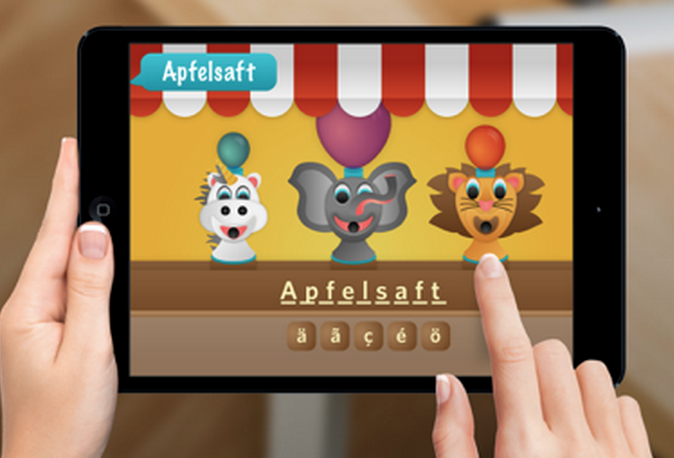 Have you started to learn some German?
Have you started to learn some German?
Here are 6 Easy German Language Games for fun learning AND building your basic German vocabulary. (The image left shows our earlier Writing Clowns Game)
These German Language Games are set up as simple Quizzes.
Each one focuses on 4 to 8 vocabulary items and one related grammar point.
Recall and practice are part of each Quiz. As an added bonus, you'll sharpen your German pronunciation.
You'll hear the key words (nouns, verbs, etc) right at the beginning in the Car Race, without translation. Just focus on listening and repeating each word aloud.
Then you're asked to choose the correct translations.
Please note that you'll have to guess some words from context. Playing a game more than once will certainly help you remember any new vocabulary!
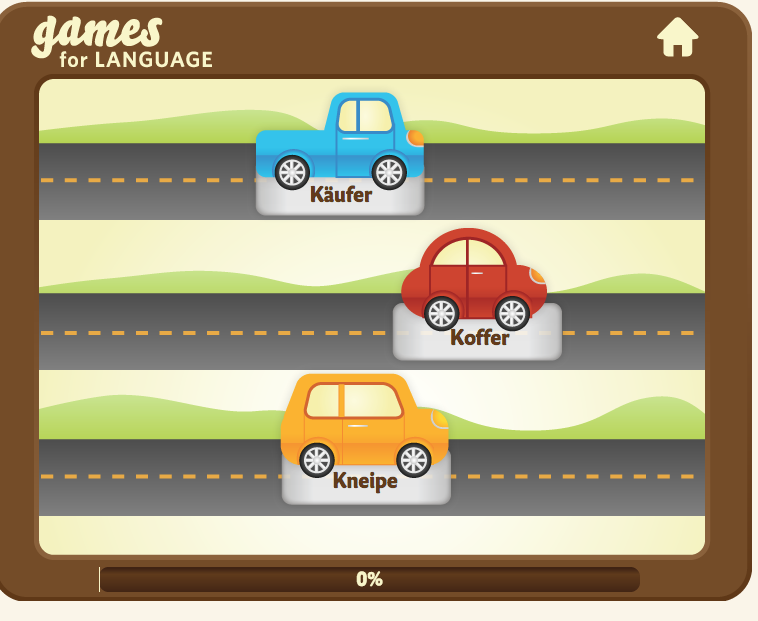 8 Nouns
8 Nouns
Click on Vocabulary Quiz #1 or on the left image.
In English all nouns have the (definite) article "the". But German has different words for "the", depending on the noun, and how you use it (eg. as subject, object, etc.)
The reason: in German, there are 3 grammatical genders: masculine, feminine, and neuter.
For example: masculine - der Apfel (the apple); feminine - die Schule (the school); neuter - das Haus (the house).
While the gender of persons, such as “die Mutter” (the mother) and “der Vater” (the father), etc. is obvious in German, the gender for most other nouns seems a little random.
However, don't despair, there are a few rules that can help. Check out 10 Easy Rules to Help Your German.
It's best to learn the article together with the noun, that's what native speakers do automatically when they learn their language.
Nouns that you hear, see or speak a lot, will become automatic for you too.
(You'll see the score when you click the “Continue” arrow.)
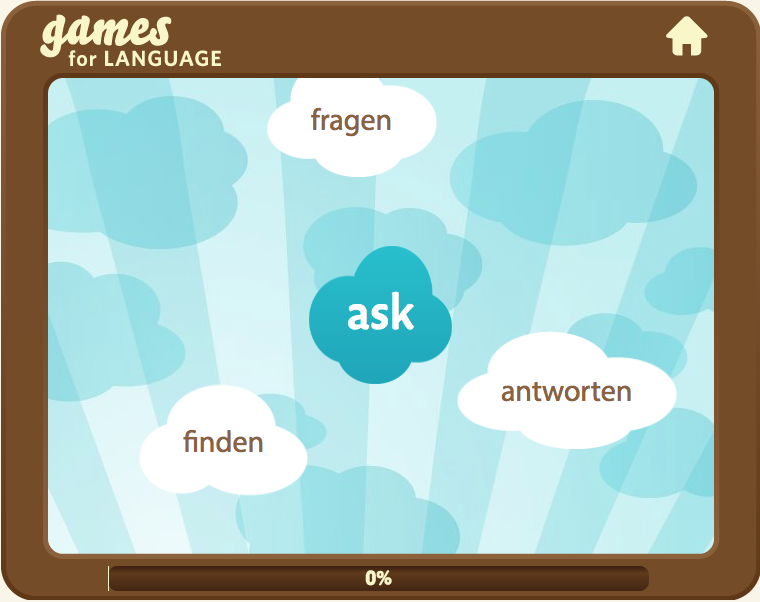 8 Regular Verbs
8 Regular Verbs
Click on Vocabulary Quiz #2 or on the left image.
For building sentences you need verbs, and in German, verbs have personal endings that you have to know.
In English you say: I do, you do, he does, we do, they do. Only the third person singular - he, she, it - deviates from the pattern.
In German you say: ich mache, du machst, er macht, wir machen, ihr macht, sie machen. That gives you four different verb endings. On top of that, you have three ways to say "you": du machst (familiar, singular), Sie machen (formal, singular and plural), ihr macht ("you-all"- familiar, plural).
Fortunately, many German verbs are regular in the present tense. The pattern is quite easy to learn.
Do you know the endings of present tense verbs?
Test yourself in this Quiz. If you miss a couple of answers the first time, play the game again until you get the hang of it. The verbs in Quiz #2 are all regular and the endings all follow the same pattern.
And while you're focusing on the endings, you'll probably learn a few new verbs as well.
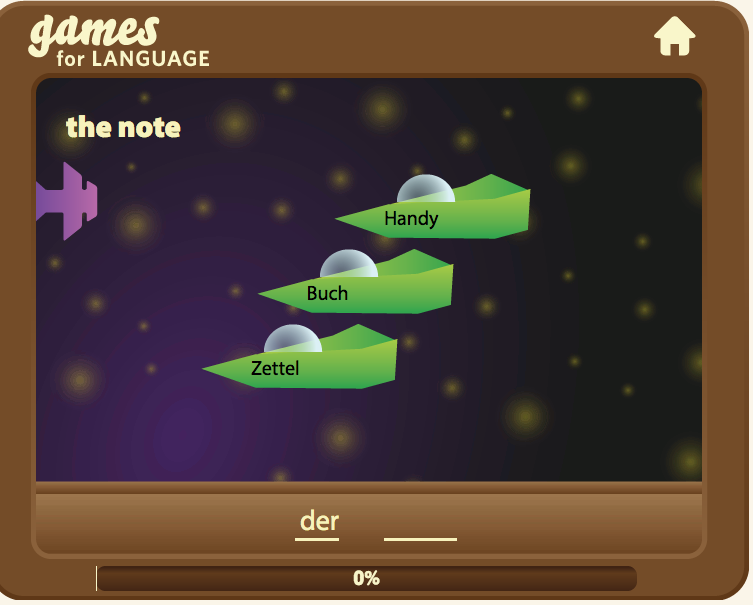 8 Easy Sentences with Direct Object Nouns
8 Easy Sentences with Direct Object Nouns
Click on Vocabulary Quiz #3 or on the left image.
Even as a beginner, it's not that hard to put together sentences to say what you want to express.
In a German sentences, it's important to put a noun into the right case.
The German language has 4 cases: Nominative (subject), Accusative (direct object), Dative (indirect object), Genitive (possessive).
For English speakers, this can sound complicated. But when you learn to use them step by step, they' don't seem quite as daunting.
This Quiz tests you on masculine, feminine, and neuter nouns as direct objects.
Starting out with 8 different Nouns and their articles, you'll put together simple sentences at the end of the Quiz.
Pay attention to the gender of the nouns when they come up. When you know the noun gender, the short sentences in the Word Invader game will be easy.
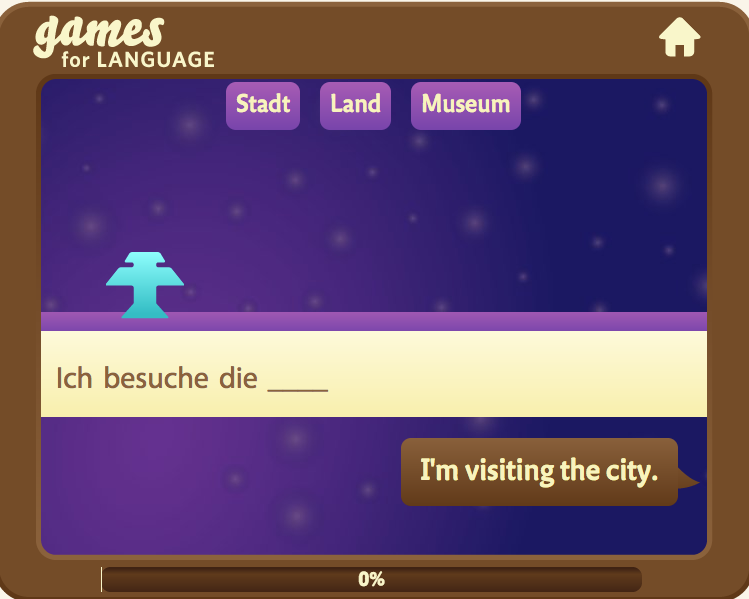 8 Verbs in Sentences
8 Verbs in Sentences
Click on Vocabulary Quiz #4 or on the left image.
Now it gets a little more challenging: Not only do you need to recall the correct gender of the nouns, but you have to apply the correct verb endings.
As in the previous games, you'll also have to pay attention to different verb endings with German “sie” or “Sie”, as in “sie begrüßt uns” (she greets us), “sie erklären” (they explain), and “Sie denken” (you [formal] think).
This Quiz tests you on 8 Verbs used in simple sentences with nouns and pronouns as directs objects.
Play it several times until you get a 90% score! (You'll see the score when you click the “Continue” arrow.)
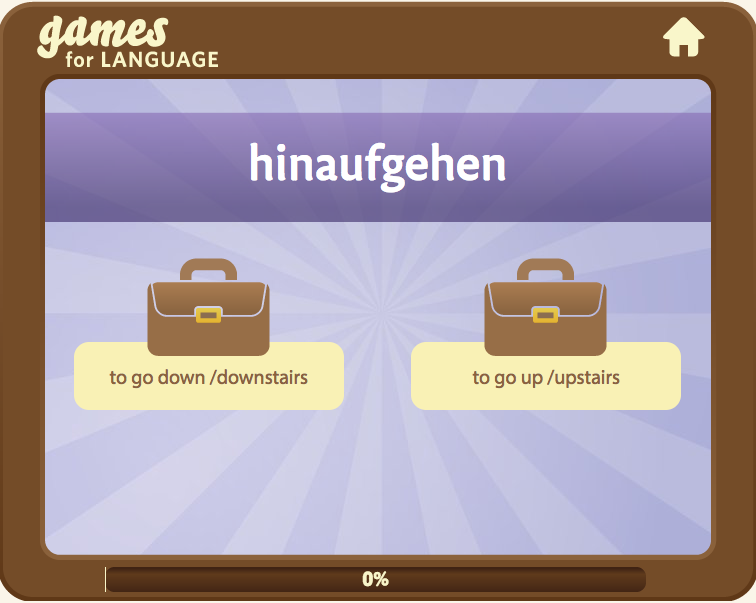 4 Separable Prefix Verbs
4 Separable Prefix Verbs
Click on Vocabulary Quiz #5 or on the left image.
Are you getting the hang of picking the correct regular verb endings? Now you can challenge yourself with separable prefix verbs, a typical feature of many German verbs.
What makes separable prefix verbs somewhat tricky, is that they require a very specific word order. In English, phrasal verbs are similar, but the word order there is more flexible.
For example: anrufen - to call, call up
You can say: I'm calling up my brother. Or: I'm calling my brother up.
In German, only one word order is possible for this sentence: “Ich rufe meinen Bruder an.” The separable prefix "an", goes to the end of the sentence.
This Quiz will test you on 4 different separable prefix verbs as part of short sentences.
And again, click the “Continue” arrow to see your correct answer percentage. Aim for at least 90%!
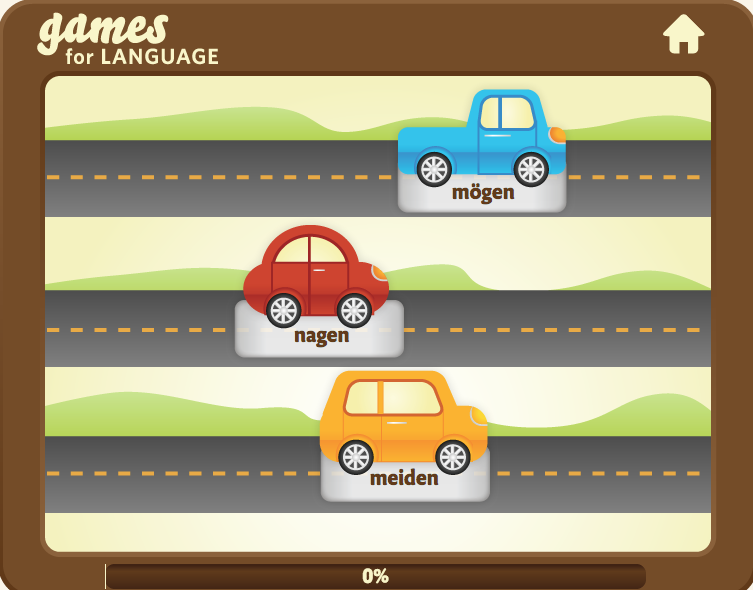 4 Modal Verbs
4 Modal Verbs
Click on Vocabulary Quiz #6 or on left image.
Modal Verbs give you important tools for expressing yourself. You'll need them for almost any conversation, to express what you want, what you can or have to do, what you would like, etc.
Unfortunately, even in the present tense form German Modal Verbs follow a different pattern from regular verbs.
In this Quiz, you'll test yourself on the basic forms of 4 Modal Verbs: können (can), wollen (want), müssen (must), and the subjunctive form of "mögen", as in "ich möchte" (I would like).
As modal verbs come up frequently in everyday conversations, we recommend that you play this quiz several times, until you get the pattern down cold.
If you're learning German as an almost-beginner, these six Quizzes will test some basic German vocabulary and certain elementary points of grammar.
But they'll also encourage you to learn new words, try new sentences and to practice your pronunciation.
Learning a language does take effort and practice. If it's just a chore for you, you're not going to get very far.
Find ways to enjoy learning and practicing. These games will add a little fun and you'll feel good when you see the 100% after you finish the Shootout and Word Invader games!
More Than a German Language Game
Don't forget: You can practice German online for FREE with our 36-Scene German 1 Story: "Michael in Deutschland" and our 72-Scene German 2 Mystery Story Sequel: "Blüten in Berlin?".
(If you already know that "Blüten" means blossom in German - you'll learn that Blüten has still another meaning...).
Just login HERE.
And, if you have any language questions - don't hesitate to contact us!
